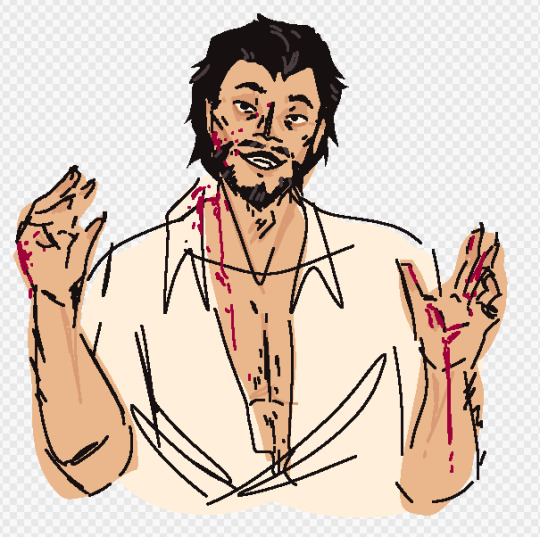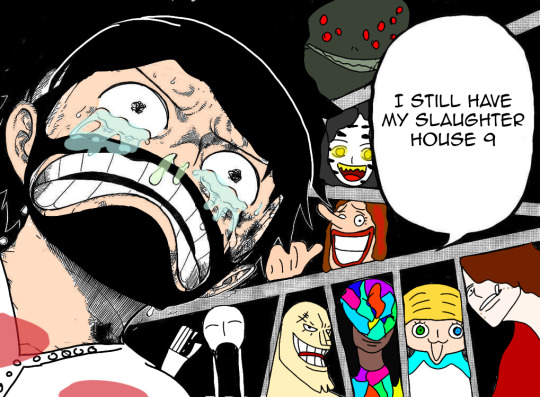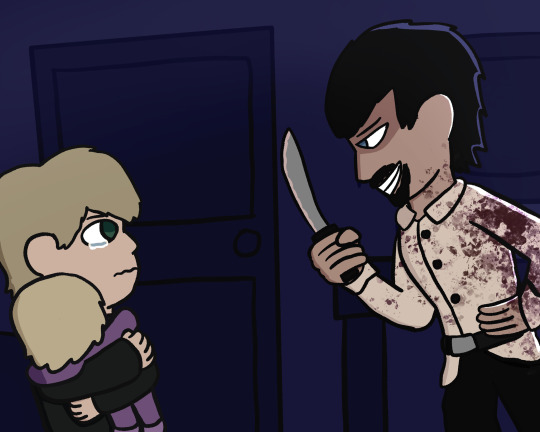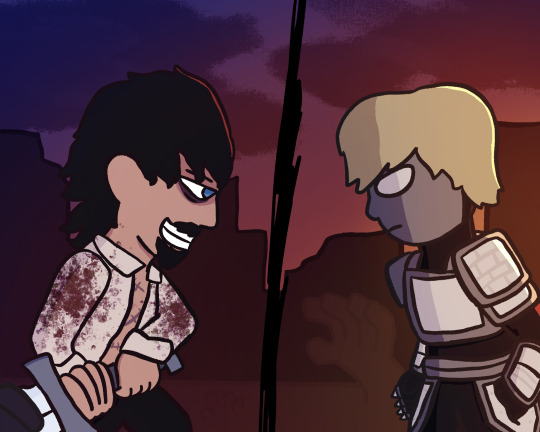#jack slash
Explore tagged Tumblr posts
Text

there's something about how lame jack is that he can't even read taylor right. Not only is this a supremely ineffective tack, he didn't even get her trigger event right. and her identity is public to boot.
#if i remember correctly taylor triggering because of her mom's death is the popular speculation following the identity reveal#so he literally just looked her up on wikipedia. this is the best he could do#wormblr#wormposting#jack slash
731 notes
·
View notes
Text

jack "better kill me in one shot. cmon im unarmed. cmon stab me. i know you won't. i kniw you want. cmon. cmon" slash.
Tangent but like. i always thought of him looking like. a little bit on death's door. guy who wants to drag everyone else down with him. Not as smart as he thinks he is, but a little smarter than people think he is. he's not an apex predator, but he's an eel. opportunistic, slippery. deeply pathetic
74 notes
·
View notes
Text
I noticed that a lot of people missed a small reference WB made about Jack Slash
So Jack Slash is obviously and purposely a Joker reference, meant to play into the fact that despite just being a homicidal clown, Joker is treated as a big bad player in the cape game (I personally find that incredibly dumb moment of him being so “crazy” that he is immune to Martian Manhunter mind powers to be the most memorable).
In Jack’s case, despite having a generally mid power (can project the edge of his blades as far as he can see), the fact that his Shard can boss other Shards around means that he’s always on top and cannot be defeated by Parahumans in a fight, so they need to use normal humans to defeat him.
The Joker and Jack Slash stuff is all well and good… until you remember there are 2 Jack Slashes.
Some of you might know what I mean, but for those who don’t, Eden’s/Contessa’s Interlude gave us an alternate timeline that shows us a heroic Jack Slash:

- Interlude 29 Worm
The Black Knight is Jack Slash, a member of the Wardens.
Jack Slash is a Dark Knight. A caped crusader with peak human skills that lets him hang with the big leagues.
He’s fucking Batman.
#Black Knight also makes me wonder about his relationship with King#parahumans#wildbow#ward#ward web serial#wardblr#worm#wormblr#worm web serial#jack slash#black knight#Batman#joker
453 notes
·
View notes
Text
ok new funniest earth aleph situation. niche video essayist Jacob Black finds out with horror about the fact that his alternate universe self is Jack Fucking Slash.
Imagine watching a 2 hour video where a man grapples with the fact that in a very slightly different universe he became The Fucking Joker.
#is it appropriate for him to joke about it?#on one hand it's an extremely funny situation but on the other Jack Slash killed SO MANY PEOPLE#made him a video essayist because its a good outlet for his navel-gazey loves-the-sound-of-his-own-voice philosophizing if. yknow.#he wasnt murdering people#parahumans#worm#jack slash
517 notes
·
View notes
Text
Jack Slash works as well as he does basically entirely on the basis of how visibly the author Does Not Like Him. There's a version of Jack Slash written by some other guy who actually unironically thinks his character archetype is hot shit, and that version sucks and the version of the story that he's in also probably sucks. This version also sucks but you can feel everyone else in the story rolling their eyes in unison at the fact that they've gotta put up with his bullshit, everyone going, "alright, can we please stop with the Dark Knight pastiche and go back to playing realpolitik with well-realized individuals who aren't homicidal cartoon characters that we're forced to take seriously purely by virtue of their inexplicable six-digit grimdark looneytunes bodycount"
525 notes
·
View notes
Text
Imp trying to stab Jack Slash and he keeps dodging on instinct. No idea she's there, just decided to do some cardio today. Getting a really good feeling about picking up a steel chair and swinging it right in front of him. Can't for the life of him figure out why.
796 notes
·
View notes
Text


14.8... when i catch you wildbow
#wormblr#parahumans#parahumans fanart#worm fanart#wildbow#worm skitter#skitter#worm bonesaw#bonesaw#slaughterhouse 9#worm spoilers#jack slash#worm taylor#taylor hebert#lisa wilbourn#worm lisa#worm tattletale#tattletale
750 notes
·
View notes
Text
Jork Slash.
108 notes
·
View notes
Text

#wormposting#wormblr#worm#jack slash#bonesaw#manequin#siberian#crawler#burnscar#slaughterhouse 9#cherish#shatterbird#bodega meme
206 notes
·
View notes
Text
Anyways, so, Shatterbird being born in Dubai is something that made a Lot of her like. Click. Particularly with how she treats Sand given how Dubai is literally a place of wealth know for ultra-extravagent shows of class disparity in the middle of a fucking desert. With a woman who holds her entire identity on the amount of class she has and her placement/recognition. Like, no shit she isn't good a controlling sand and it feels like static to her, it might as well be a symbol of lower class to her. The wealthy and influential got to stay inside of glass and control it, those without any Didn't. The fact she got that with a Cauldron vial is hilarious too. How the hell do you get that lucky. I'm like 90% sure that the sand thing could be further improved via training and mental exercises she can't do because it would fuck up some subconscious stigma in her head.
Which makes her subscription to the Slaughterhouse 9 and her affection for Jack all the funnier, because they're literally murder hobos. Jack could probably sleep in a dumpster and have his entire life be revealed for the grifting lie it is and he'd go back to slashing like nothing happened. And she fell for him. She fell for the serial killer equivalent of a hipster who plays music in his van and says he's gonna tear down the system. She fell for a guy with like, NEGATIVE class. She's a girl who went to a preppy private school who fell for the first person to probably make her question her ideas about class since Jack Slash is the most unfair person to fight/plan against in worm and is Weirdly effective, despite not having Any class, and made her question some of her stigma while breaking her down in the S9 trials. Thats right, this fucked up murder pair is actually an example of a underclass, unprivleged guy making someone born into a place of wealth and influence question the importance of Class when they can do So much without it. . . Which is such a funny spin on that trope. Since. They're just piece of shit serial killers who are only applying this to the 'art' of mass murder, and nothing else. He probably just helped her think "Woah, actually, I can murder WITHOUT needing to make it a metaphor in relation to a Freudian psychological theory, and that can make it More painful since it's senseless!" And that's it. She thinks she's evolving past pre set ideas of class with Jack but all she's doing is changing very surface level stuff and tolerating things, while trying to find roles/positions of power to put herself into for her identity. Like being the 9's Herald. Anyways. Just some headcanons after reading the missing interlude for research on my last post.
124 notes
·
View notes
Text
Jack was still grinning. “What would you do to people like me, then? Let’s say you got powers. Would you right wrongs, lecture schoolchildren on doing what’s right, and see bad guys like me carted off to the Birdcage?”


“People like you? I’d kill. Sir.”
Fun fact: Theo is crying in both of these scenes, it’s just covered by the mask.
I feel like Golem is one of the more underrated characters of Worm (at least if fanfics are anything to go by), probably because his part in it comes pretty late in the story. Kid with no powers managed to work up the courage to say he’d kill Jack to his face, and in doing so accidentally tied himself to Dinah’s end of the world prophecy. And through 2 years of hard work and grueling training, he got pretty close to being the hero he wanted and needed to be. He may have failed to defeat Jack on his own, but that was never in the cards from both an in universe and meta perspective. One of the few outright good guys in the series, coming pretty far from his upbringing.
#wormblr#parahumans#worm spoilers#wildbow#fanart#chicago wards#theo anders#golem#jack slash#aster anders
195 notes
·
View notes
Text

Skitter Vs. The Black Knight. AKA. A different sort of Slaughterhouse Nine arc
Rather than the carnage of the Nine, he's slow and methodical. Equally as frustrating to go up against, but in a different way. Gist is he gets called in post-Echidna (He was dealing with some different bullshit at the time), as Tagg is tired of the Undersiders reign. No one likes him, because him showing up means Everyone Has Fucked Up, enough to the point the PRT things "seven dead in miama, twenty missing limbs" is worth the PR cost.
It's still Jack Slash: you're never winning with him. Anyway read a snip i made :]
195 notes
·
View notes
Text
Death Battle: Spider-Man vs The Slaughterhouse 9!
Commission me on Ko-Fi!










#parahumans#wildbow#ward#ward web serial#wardblr#worm#wormblr#worm web serial#slaughterhouse nine#s9#jack slash#Siberian#Shatterbird#bonesaw#murder rat#Cherish#Burnscar#mannequin#hatchet face#spiderman#spider man#spider-man#spider verse#marvel#marvel comics#death battle
171 notes
·
View notes
Text
Ah, hello! Late at work? I'm looking at your family photos: they look great, so soulful!

178 notes
·
View notes
Text
Since Hero!Jack Slash seems to be making a momentary resurgence around here this seems like a good time to pitch my favorite free-floating pathetic wet-rat situation in which to stick him (assuming his status as the inept leader of a band of z-list vigilantes rather than a protectorate-backed hero):
A sequence in which he gets abducted and trapped in a torture basement by a group of completely unpowered goons, before being forced to fight his way free with a series of increasingly-cumbersome blunt objects (chair leg, loose brick, can of expired soup, folding chair, overloaded cardboard box, rubber mallet) and every object of convenience he grabs is just a few inches closer to him than something he could much more easily use his power on
120 notes
·
View notes
Text
The two twelve-year-olds HARBINGER and the freshly-dubbed JACK SLASH stand over the cooling body of KING
HARBINGER: With KING dead, there's only five of us left now. JACK SLASH: They'll start calling us the Slaughterhouse-Five if we don't recruit soon. HARBINGER: I suppose? JACK SLASH: One could say that this whole endeavour was a bit of a Children's Crusade, wouldn't you? HARBINGER: JACK SLASH: HARBINGER: JACK SLASH: Get it. KING named the group after the hit novel by Kurt Vonnegut. So I said- HARBINGER: Why would I know that. I joined the SLAUGHTERHOUSE at age 9 specifically so I didn't have to go to middle school. JACK SLASH: You really ought to get more educated on this sort of stuff. It can add such a delightful pizzazz to killings. HARBINGER: JACK SLASH: HARBINGER: JACK SLASH: HARBINGER: JACK SLASH: HARBINGER: I don't think the SLAUGHTERHOUSE is for me anymore.
214 notes
·
View notes